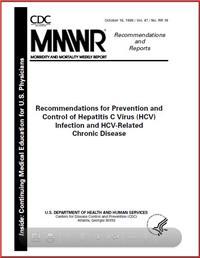This report discusses the hepatitis C virus (HCV), how it is treated, and how it can be prevented. The report examines the epidemiology of HCV. It discusses the screening tests, history, general treatment, and postexposure prophylaxis for HCV. The report explains the ways that HCV can be transmitted from person to person and how the virus can be spread through bodily fluid. It identifies the most serious high risk behaviors such as injection drug use and certain sexual practices. The report cites the risks associated with health care work. It lists the persons who should be tested regularly for HCV and the procedures involved in the HCV testing process. The national surveillance for acute HCV, laboratory discoveries of anti-HCV positive tests, serological surveys, and surveillance of chronic liver disease are discussed. The report makes predictions and recommendations about the future of HCV.
Format:
Report
Publication Date:
1998
ID:
21761
- Physicians
- Viral Hepatitis
- Hepatitis C


